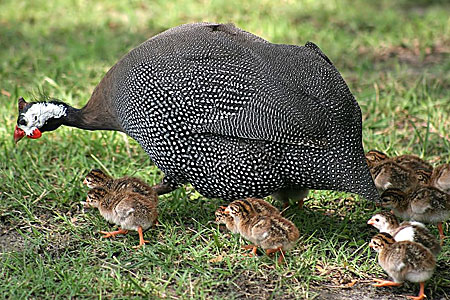
Guinea fowl are fiercely protective parents. Unfortunately they don’t seem to grasp the concept that their little ones can’t move as fast as the big guys. As a result, the keets easily get lost. Further, during their first two weeks of life baby guineas, or keets, chill easily. Trapsing through dew-wet grass while trying to keep up with Mama causes chilling that can lead to weak or dead keets. Letting a free-range guinea raise her own keets therefore often ends in heartache. Fortunately, there are other ways to brood guinea fowl successfully.
Confine the Guinea Hen with Keets
Despite their carelessness with their keets, guinea hens are ferocious mothers. If one hatches a brood inside a coop occupied by chickens or other poultry, she is quite likely to bully the other birds in a misguided attempt to protect her keets.
If you want your guinea hen to raise her own keets, you’d be wise to confine her to a safely enclosed brooding pen. She’ll need to be swiftly, but carefully, moved at night, along with her keets, or eggs before they hatch. Otherwise she (and any kin that might be present) are likely to attack anyone who attempts to gather up the little ones.
Situate the pen where the mother and her brood easily can see the rest of the guinea flock, preferably inside the larger guinea pen. Cover the pen so the birds can’t fly out. And surround it by tight enough wire mesh that the tiny keets can’t slip out at ground level.
By the time the keets are about four weeks old they will have their first set of feathers and be ready to start flying. At that time you can return the Mama and her brood to the main guinea flock.
Let a Chicken Do It
Chickens are much more careful mothers than guinea hens. Even if the broody hen doesn’t hatch the eggs herself, she might raise the keets as their foster mom.
Under normal conditions a hen and her brood make initial contact through sound rather than sight. So a foster broody is more likely to accept keets slipped under her at night. That gives her the entire night to hear them peep.
An advantage to letting a chicken brood keets is that the keets will be somewhat calmer compared to being brooded by a guinea hen, or even by you. Be aware that keets grow fast. So if your broody hen is a Silkie, or any other bantam, at a month old the keets will be nearly the same size as their foster mom.
Brood the Keets Yourself
If you don’t have a broody guinea or chicken hen, you might opt to brood the keets yourself. Brooding keets is not much different from brooding chicks. An exception is that keets are smaller and more delicate during their first two weeks of life.
The one disadvantage to brooding keets apart from mature birds is that they can be difficult to integrate into the flock. Older guineas are likely to consider them to be intruders and run them off. To avoid this eventuality, before turning out the young ones, confine them to a pen similar to one used for a broody guinea hen, placed inside the coop.
The young guineas will be safe from harassment. Meanwhile, the older guineas will likely spend a lot of time hanging around the pen. So when the young ones are eventually turned loose, the whole flock already will be well acquainted.
And that’s today’s news from the Cackle Coop.
Gail Damerow is the author of Hatching and Brooding Your Own Chicks: Chickens, Turkeys, Ducks, Geese, Guinea Fowl


Great article and oh so true on everything you said about raising guinea fowl. I have tried all three methods, and the best by far for me was a “mother foster chicken.” I purchase eggs from you last year, and my hen hatched out every egg! She hatched 18 babies and is a great mom to this day. The one thing I noticed is that the other older guinea fowl wanted her babies as they started to mature. She still would protect them, so I had to separate the babies from mom because the older guineas started picking on her. I let everyone free-range during the day. However, separate coups for mom and the other chickens at night and the babies (now adults) are with the older guineas in their coup. Everyone seems happy.